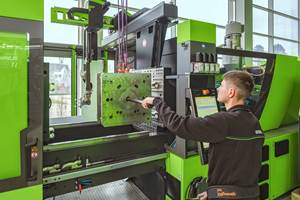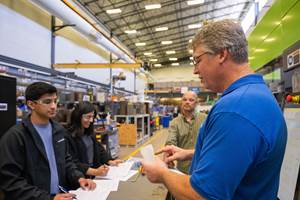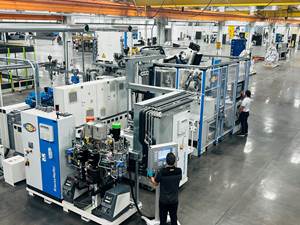Logistics, Training & Teamwork Support Custom Processor’s Juggling Act
In the 50 years since it opened its doors as a custom thermoformer in Hanover, Pa., McClarin Plastics’ world has grown a lot more complicated.
In the 50 years since it opened its doors as a custom thermoformer in Hanover, Pa., McClarin Plastics’ world has grown a lot more complicated. The company now employs around 100 people at three plants in Hanover. Two plants are devoted to thermoforming and the third to thermoset fiberglass composites. In a typical year, McClarin serves roughly 100 customers, tools up for about 120 new or revised programs, and generates $17 million in sales.
McClarin’s customers range from heavy construction-equipment OEMs to producers of water and sewer pipe, automotive assemblies, and other highly engineered durables. Roger Kipp, v.p. of marketing and engineering, notes that most of the parts his company now makes are produced just-in-time and in short runs of up to 1000 pieces.
Another complicating factor is the company’s expansion into assembly and painting services. Three-fifths of McClarin’s programs now involve assembly of its parts with more than 10,000 others purchased from outside.
Focus on logistics
Two years ago, in response to growing operational complexity, McClarin initiated a shift to lean manufacturing with emphasis on teamwork, training, and innovation. “The logistical flow from our three plants and vendor and customer facilities is incredible,” says Kipp. He cites a recent order for 65 mass-transit cars, which required that 350 parts fabricated or purchased by McClarin be combined in kits for shipment to the OEM.
One McClarin plant focuses on rotary vacuum forming of pipe fixtures, truck-bed liners, and other structural parts. The second plant forms outboard-engine fairings and housings, building products, lighting shrouds, returnable packaging, and more.
The third facility performs open-mold spray-up, hand lay-up, cold molding, RTM, and low-pressure SMC compression molding of fiberglass composites. A third of McClarin’s OEM customers use both composite and thermoformed parts, and they often switch processes to optimize cost.
Teamwork has proven effective in tackling the logistical traffic jam that comes with such a varied custom business. A unified purchasing team coordinates buying for all McClarin’s plants with the aid of System 2000 manufacturing management software from Vormittag Associates, Inc. in Ron konkoma, N.Y. It integrates material requirements planning (MRP), forecasting, purchasing, scheduling, and general ledger functions to help track customer orders through production and ensure that the right materials are available for each job. Kipp adds that a disciplined system for incoming parts inspection and inventory control is essential to keeping a firm grip on all this activity.
Teamwork and training
McClarin’s “Improved Design, Evaluate And Suggest” (IDEAS) team meets weekly. It brings together a cross-section of job functions from all facilities. New projects are reviewed to generate novel approaches.
Materials review sessions are held quarterly among design and engineering staffs to increase their awareness of new resins and additives. Design and engineering teams execute projects that often generate significant payoffs. One initiative introduced a fluoropolymer film mask as a reusable mold release for thermoforming. Compared with spray-on releases, the mask cuts volatile emissions and tool maintenance. McClarin is also experimenting with honeycomb structural cores in thermoformed parts for metal replacement.
Todd Kennedy, McClarin’s president, views training programs as a critical investment that provides a competitive edge. Basic skills courses like blueprint reading and workplace math are now compulsory. They help build a dependable level of skill at all plants and facilitate job rotation in response to production needs. McClarin also set up a training center with a professional staff. Ten workers have completed certification courses, and other employees have been granted leaves of absence to pursue academic degrees.
The firm recently hired a former high-school guidance counselor to direct school-to-work programs. He has recruited local high-school students for introductory classes and on-the-job mentoring programs to create a pool of promising entry-level workers.
Related Content
Mold-Change Time Targeted with Training, Technology
Engel is offering technology and training to molders to help them optimize their mold-changing process.
Read MoreEducating the Next Generation of Plastics Professionals
These schools and local industry are working together to close the workforce gap in the plastics industry by offering hefty plastics curricula and training programs for degree-seeking students as well as current plastics employees looking to upskill.
Read MoreKraussMaffei and NIAR Propel Injection Molded Thermoplastic Composites
The maker of plastics processing equipment has placed a machine and an injection molding expert in NIAR’s ATLAS lab in Wichita, Kansas, to help molding, composites and aerospace take off.
Read MorePaulson Training Acquired
Certus, a technical skills training business and portfolio company of private equity firm Ridgemont Equity Partners, has acquired the plastics processing training business founded in 1981.
Read MoreRead Next
People 4.0 – How to Get Buy-In from Your Staff for Industry 4.0 Systems
Implementing a production monitoring system as the foundation of a ‘smart factory’ is about integrating people with new technology as much as it is about integrating machines and computers. Here are tips from a company that has gone through the process.
Read MoreBeyond Prototypes: 8 Ways the Plastics Industry Is Using 3D Printing
Plastics processors are finding applications for 3D printing around the plant and across the supply chain. Here are 8 examples to look for at NPE2024.
Read More











